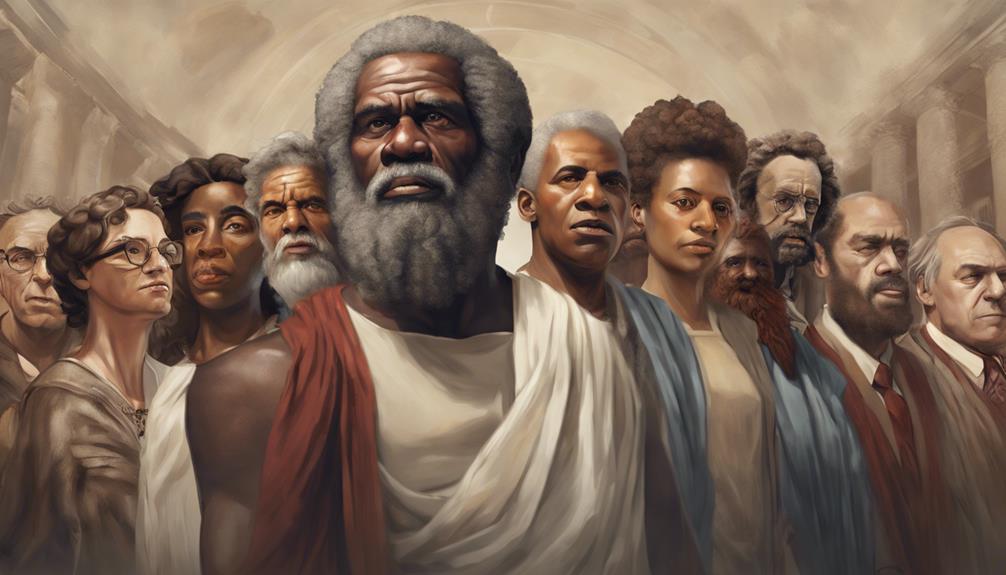Explore the roots of oratory with the pioneers of public speaking. Ancient Greeks like Pericles and Aristotle laid the groundwork for persuasive techniques. Roman orators such as Cicero continued the legacy. Their influence echoes through modern communication practices. Delve into the transformative impact and rich history of oratory, revealing a timeline shaping the art of persuasive communication from ancient civilizations to the present.
Key Takeaways
- Ancient Greek orators like Pericles laid the foundation for public speaking.
- Cicero refined oratory with balance and eloquence in speeches.
- Frances Wright and Maria Stewart were early advocates for social reform through public speaking.
- Quintilian's five canons of rhetoric established principles for persuasive communication.
- Oratory in governance empowered individuals in political participation and decision-making.
Ancient Greek Influence
Exploring the origins of public speaking, investigate the profound influence of Ancient Greece on the development of oratory skills and persuasive communication.
In Ancient Greece, oratory skills were highly esteemed, intertwined with the democratic process. Figures like Pericles utilized persuasive techniques to sway public opinion, showcasing the power of effective public speaking.
The roots of rhetoric and persuasive communication can be traced back to Ancient Greek philosophers such as Aristotle. Aristotle's classifications of oratory, emphasizing ethos, pathos, and logos, laid the foundation for successful public speaking strategies. This framework highlighted the importance of credibility, emotional appeal, and logical reasoning in persuasive speech.
The influence of Ancient Greek oratory extended beyond its borders, impacting Roman orators like Cicero, who further refined rhetorical techniques. Cicero's contributions built upon the Greek foundations, shaping the evolution of public speaking and persuasive communication for generations to come.
The legacy of Ancient Greece in oratory skills and rhetoric continues to resonate in modern communication practices.
Development of Rhetoric

The development of rhetoric in Ancient Greece responded to the need for effective communication in democratic societies, establishing a foundation for persuasive speaking techniques. Aristotle, considered the founder of rhetoric, defined it as the art of persuasion through effective communication. Cicero, a prominent Roman statesman and orator, highlighted the significance of maintaining a balance between content and delivery in oratory. Additionally, Quintilian, a renowned Roman rhetorician, detailed the five canons of rhetoric, which encompassed Invention, Disposition, Style, Memorization, and Delivery. These structured techniques were essential for individuals to convey their messages convincingly and engage effectively with their audiences.
| Rhetoricians | Contribution | Notable Works |
|---|---|---|
| Aristotle | Founding rhetoric | 'Rhetoric' |
| Cicero | Emphasized balance | 'De Inventione' |
| Quintilian | Outlined five canons | 'Institutio Oratoria' |
Pioneering Figures in Oratory
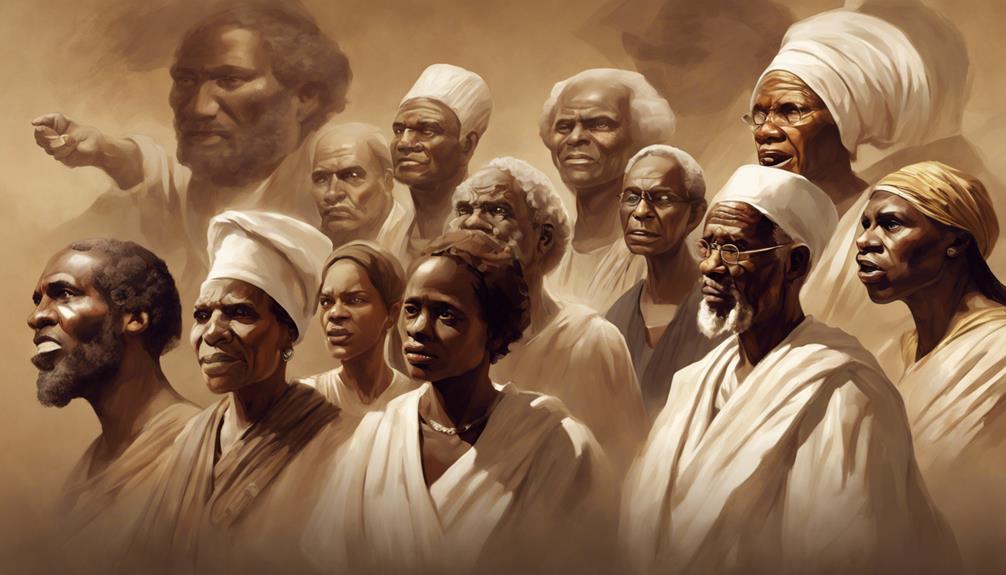
Cicero's masterful eloquence and profound influence mark him as one of the foremost pioneers in the field of oratory. Known as one of the greatest Latin orators and prose writers in history, Cicero's speeches and writings have left an indelible mark on the art of public speaking.
Demosthenes, the ancient Greek orator, demonstrated unparalleled dedication by overcoming speech impediments through disciplined practice, establishing himself as a prominent figure in oratory.
Quintilian, the Roman rhetorician, emphasized the moral aspects of oratory in his twelve-volume rhetoric textbook, shaping the way public speaking was taught and practiced.
Figures like Frances Wright, Maria Stewart, and the Grimké sisters further advanced the field by advocating for social reform and women's rights through their impactful speeches. These pioneers in oratory paved the way for future generations of public speakers to use their voices for meaningful change and progress in society.
Impact on Democracy
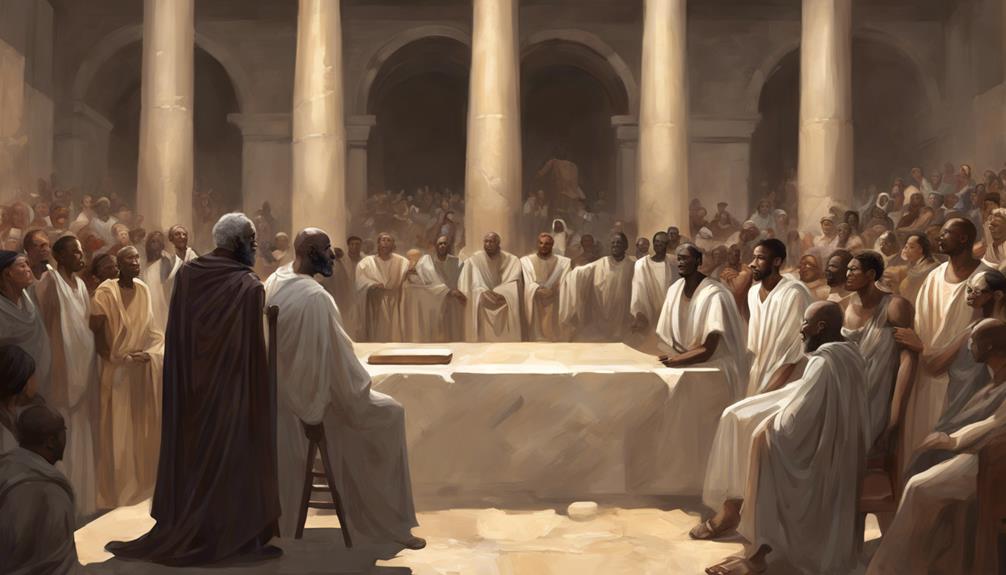
Public speaking's roots in Ancient Greece as a tool for democratic discourse greatly influenced the governance and decision-making processes.
Oratory's ability to sway opinions and advocate for various positions played a vital role in shaping democratic principles.
Understanding the impact of oratory on democracy sheds light on the evolution of public speaking's essential role in political participation and governance.
Democratic Roots of Oratory
Rooted in the democratic ethos of Ancient Greece, the tradition of oratory profoundly influenced civic engagement and political discourse. In Athens, public speaking wasn't just a skill but a civic duty essential for active participation in the democratic process. The Athenian democratic system required individuals to present their arguments persuasively in public assemblies, where orators could sway opinions, propose laws, and shape decisions.
Oratory in Ancient Greece empowered individuals to voice their opinions, advocate for change, and influence political outcomes within the democratic framework. Aristotle defined rhetoric as the art of persuasion, a tool that became instrumental in the history of public speaking and the development of democratic societies.
The democratic roots of oratory highlight its significance in enabling citizens to engage in public discourse, exercise their rights, and contribute to the collective decision-making process.
Oratory's Democratic Influence
The democratic impact of oratory in ancient Greece profoundly shaped civic engagement and political discourse, emphasizing the pivotal role of public speaking in influencing democratic processes. Oratory was intrinsically linked to democracy, with public speaking serving as a cornerstone for civic participation and the functioning of democratic institutions.
In ancient Greece, the shift from oral to written laws underscored the power of oratory in advocating for positions and swaying decisions within the democratic framework. Assemblies were established for deliberation and lawmaking, showcasing how public speaking was instrumental in shaping policies through democratic means.
The emergence of rhetoric as a study of persuasive techniques further solidified the importance of effective communication in democratic settings, as highlighted by Aristotle's definition of rhetoric as essential for democratic discourse. Pioneers like Aristotle, Cicero, and Quintilian laid the groundwork for oratory's democratic influence, shaping political discussions and fostering civic engagement through the art of persuasion.
Evolution of Persuasion Techniques

As you explore the evolution of persuasion techniques in oratory, you'll discover the rich history rooted in ancient Greece.
Aristotle's groundbreaking classification of persuasion into ethos, pathos, and logos revolutionized the art of public speaking.
From balancing content and delivery like Cicero to Quintilian's five canons of rhetoric, these pioneers laid the groundwork for modern persuasive strategies.
Ancient Rhetorical Techniques
During the evolution of persuasion techniques in ancient times, rhetorical methods underwent significant developments in Greece and Rome, shaping the foundation of public speaking as it's understood today. In ancient Greece, Aristotle introduced the concepts of ethos, logos, and pathos, emphasizing credibility, logic, and emotions in persuasion.
Quintilian, a prominent Roman orator, further refined these techniques by highlighting the five canons of rhetoric: Invention, Disposition, Style, Memorization, and Delivery. Emphasizing moral aspects, Quintilian stressed the importance of not only what's said but also how it's presented.
Cicero, another influential Roman figure, advocated for a harmonious blend of substance and style in oratory, rejecting empty eloquence for meaningful communication. Emotional appeal played a pivotal role in ancient persuasion, with a preference for positive emotions to sway audiences effectively.
Additionally, the shift from oral to written laws in Athens underscored the significance of public speaking in shaping societal norms and governance. The ancient rhetorical techniques laid the groundwork for modern public speaking practices, emphasizing not only the power of words but also the art of persuasive delivery.
Persuasion Through Emotions
How can emotions be effectively utilized in persuasive public speaking to influence audience attitudes and actions?
Aristotle, a pioneer in the field of oratory, stressed the importance of pathos, or engaging audience emotions, as a fundamental element of persuasive speech.
Cicero, another influential figure, believed in combining emotional appeal with logical reasoning to craft impactful speeches.
It has been found that triggering positive emotions rather than negative ones is more effective in swaying audiences during public speaking engagements.
For instance, charity advertisements often evoke feelings of guilt to prompt action by appealing to the audience's emotions.
Additionally, offering solutions that replace negative emotions with positive ones can enhance the persuasive power of public speaking.
Modern Persuasive Strategies
Embracing the evolution of persuasion techniques, modern public speakers now prioritize emotional appeal and positive messaging to engage audiences effectively. In contemporary public speaking, the focus has shifted towards triggering positive emotions such as satisfaction and offering solutions rather than relying on negative emotions. This shift enables speakers to connect with their audience on a deeper level and foster a sense of empathy and understanding.
One prevalent strategy in modern persuasion techniques involves the use of charity advertisements that evoke guilt to prompt action. By tapping into the audience's emotions, speakers can effectively convey their message and inspire change.
The integration of emotional appeal and positive messaging has become pivotal in capturing and maintaining audience attention in today's fast-paced world.
Influence on Modern Communication
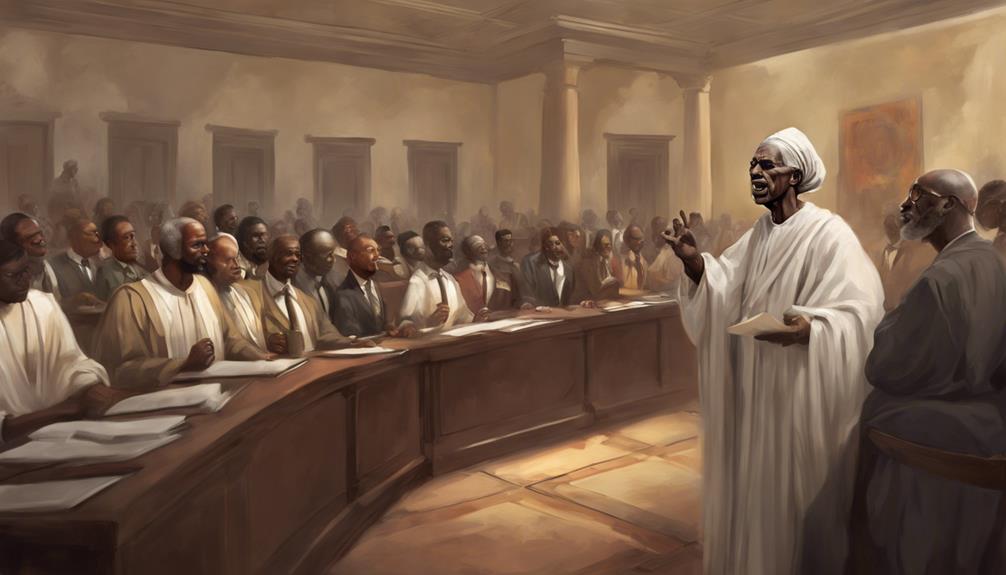
Importantly, modern communication techniques bear a profound influence from the pioneering work of orators like Aristotle, Quintilian, and Cicero. These ancient figures emphasized the importance of ethos, logos, and pathos in persuasive communication, principles that are still fundamental in effective communication today.
Aristotle's focus on credibility (ethos), logic (logos), and emotional appeal (pathos) laid the groundwork for crafting compelling messages that resonate with audiences. Quintilian and Cicero further developed these concepts, stressing the need to balance content and delivery to enhance the impact of speeches.
The enduring legacy of these orators is evident in modern public speaking practices, where speakers continue to leverage emotional appeal, logic, and credibility to engage listeners. By drawing on the timeless insights of Aristotle, Quintilian, and Cicero, communicators today aim to create speeches that not only inform but also persuade and inspire.
The influence of these historical figures underscores the lasting relevance of their contributions to contemporary communication strategies.
Notable Oratory Styles
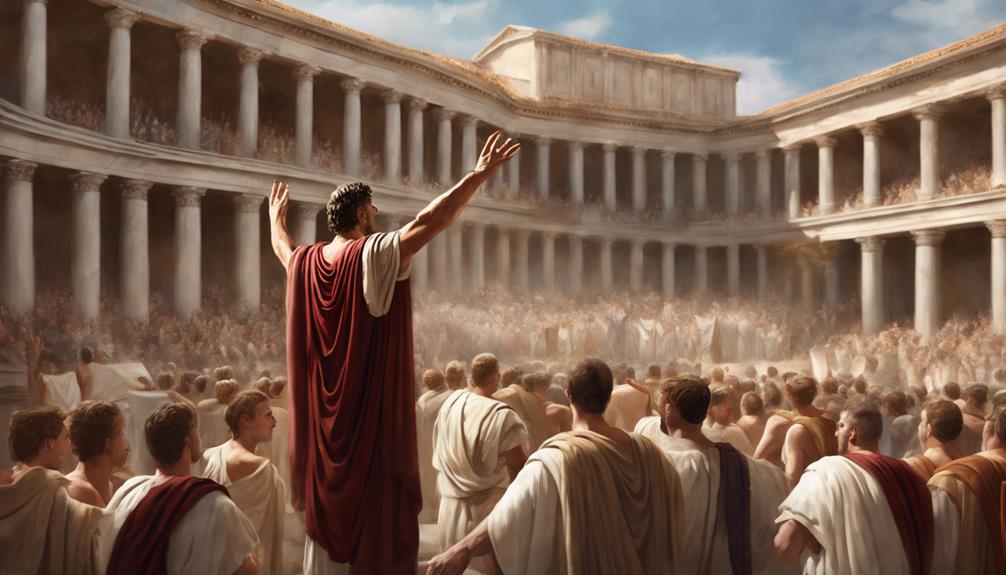
The art of oratory encompasses a variety of styles employed by influential figures throughout history to deliver impactful speeches. Demosthenes, a Greek orator, demonstrated the power of disciplined practice by overcoming speech impediments to become a master of public speaking.
Cicero, a Roman statesman, highlighted the significance of balancing style and substance in oratory to craft persuasive speeches that resonate with the audience. Quintilian, a Roman rhetorician, established the five canons of rhetoric, including style, emphasizing its pivotal role in effective communication.
Notable figures like Margaret Thatcher, the first female British prime minister, adopted an assertive and aggressive oratory style to effectively convey her political messages. On the other hand, Mahatma Gandhi connected with diverse audiences through simple language and powerful messages of nonviolence, showcasing a different yet equally impactful style of oratory.
These examples illustrate the importance of adopting a balanced oratory approach that combines style with substance to deliver compelling speeches that leave a lasting impression.
Enduring Oratory Principles
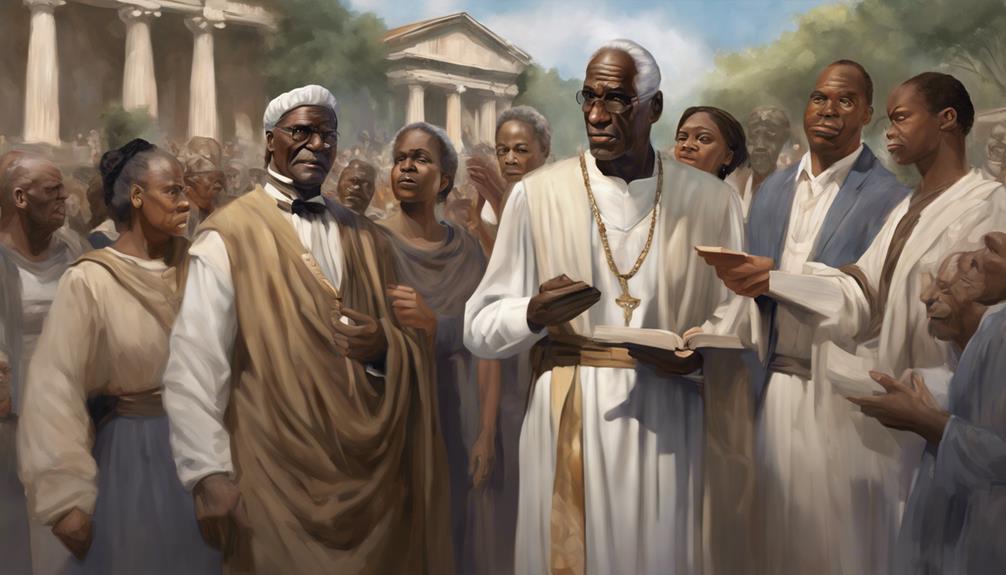
Established by ancient Greek orators, the enduring principles of oratory form the foundation for effective public speaking techniques still utilized today. These principles, advocated by influential figures such as Aristotle, Quintilian, Cicero, Demosthenes, and Pericles, have stood the test of time and continue to shape persuasive communication.
Here are some key aspects of these enduring oratory principles:
- Ethos: Establishing credibility and trustworthiness with the audience.
- Pathos: Engaging and appealing to the emotions of the listeners.
- Logos: Employing logical reasoning and evidence to support arguments.
- Balance of Content and Delivery: Emphasized by Cicero, ensuring that substance and presentation are harmoniously integrated.
- Five Canons of Rhetoric: Introduced by Quintilian, including Invention, Arrangement, Style, Memory, and Delivery, to guide orators in constructing compelling speeches.
Frequently Asked Questions
What Is the Origin of Oratory?
The origin of oratory lies in Ancient Greece, where public speaking was an essential skill. The term 'oratory' stems from the Latin 'orare,' meaning 'to speak.' Scholars like Aristotle and Cicero laid its foundation.
What Are the Origins of Public Speaking?
Public speaking goes way back. It started in Ancient Greece, tied to democracy's rise. Aristotle, the rhetoric guru, pioneered persuasion through speech. Roman orators like Cicero and Quintilian then upped the game, shaping modern public speaking.
When Did the Practice of Oratory Emerge?
Oratory emerged as a prominent practice in Ancient Greece during the era of democracy. It became integral in Athenian assemblies for debating and creating laws, influencing public opinion and advocating positions in courts.
What Is Oratory in Public Speaking?
Oratory in public speaking is the art of delivering persuasive and compelling speeches to engage, inform, and influence listeners. It involves using effective language, gestures, and vocal techniques to shape historical events and inspire change.
How Have Modern Speakers Built Upon the Foundations of the Pioneers of Public Speaking?
The legacy of the pioneers of public speaking lives on, with newage orators redefining modern communication. From classical oratory to TED talks, modern speakers have built upon the foundations laid by these pioneers, embracing technology and diversity to engage and persuade audiences in new and impactful ways.
Conclusion
So, as you reflect on the origins of oratory, remember the power of persuasion that these pioneers wielded. Their legacy lives on in the way we communicate and influence others today.
Let their passion for rhetoric inspire you to craft your own compelling speeches, using their timeless techniques to captivate your audience and make a lasting impact.
After all, as Aristotle once said, 'Persuasion is achieved by the speaker's personal character when the speech is so spoken as to make us think him credible.'

